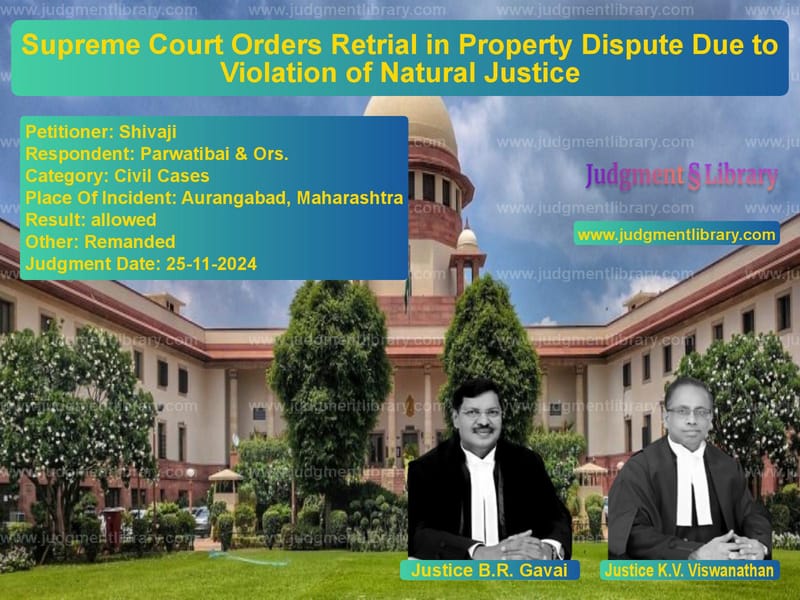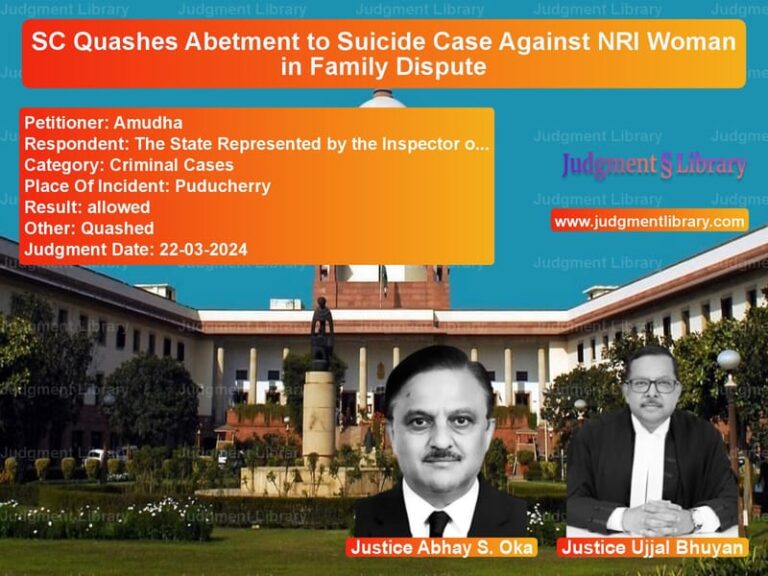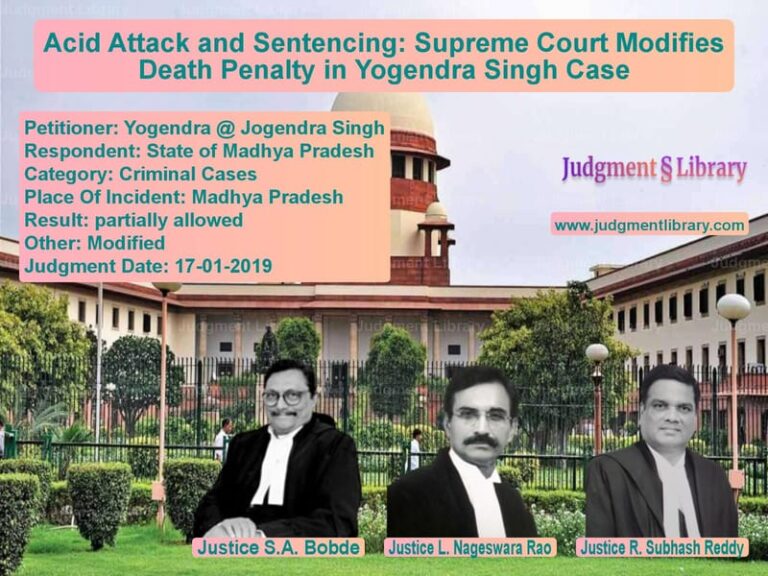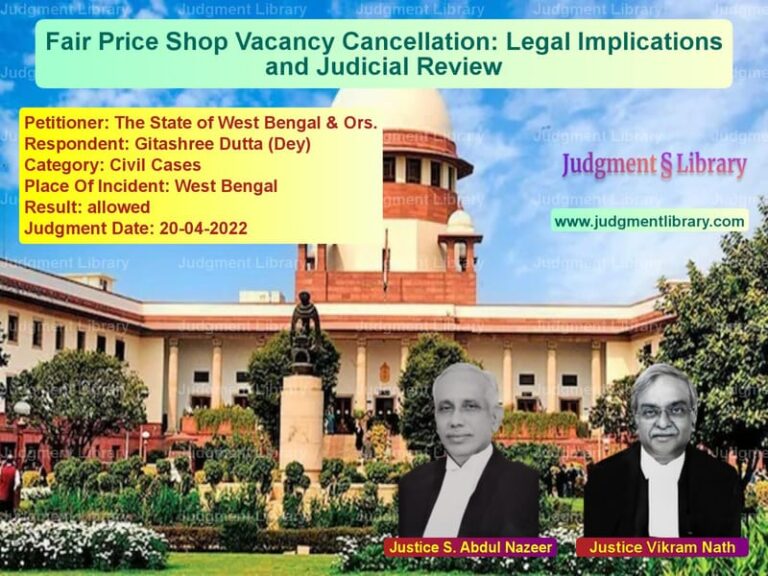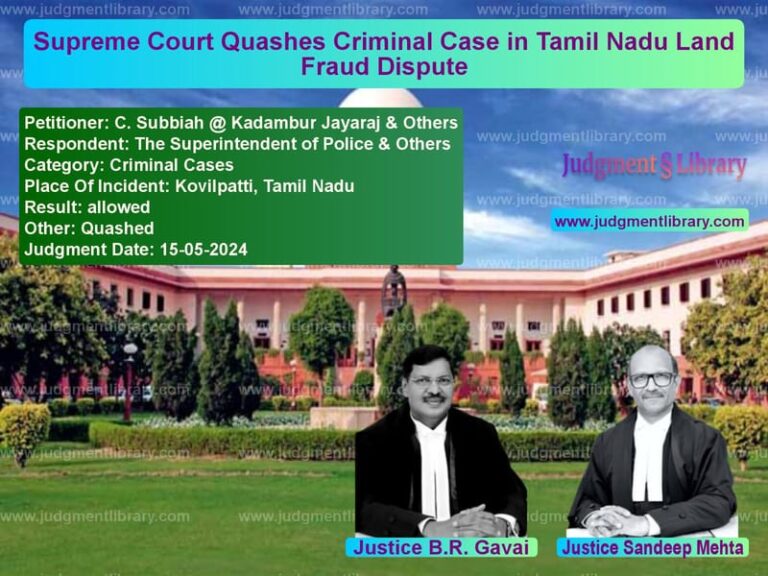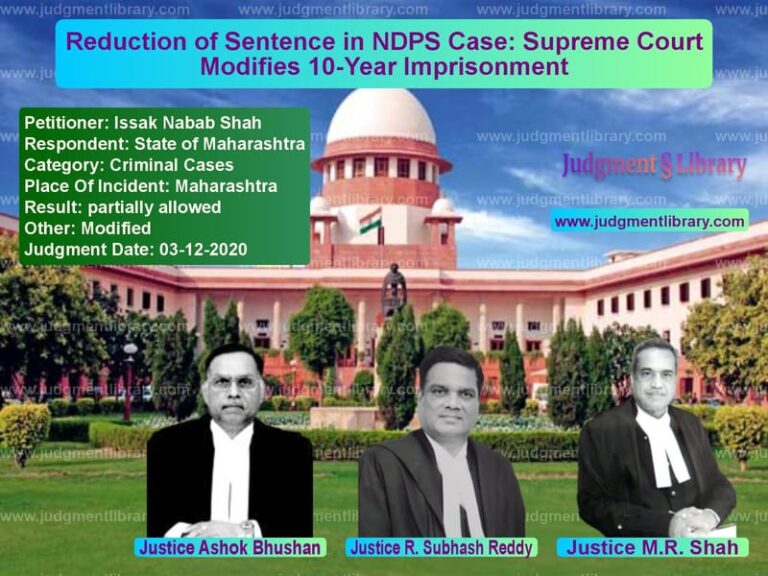Supreme Court Orders Retrial in Property Dispute Due to Violation of Natural Justice
The Supreme Court of India, in the case of Shivaji v. Parwatibai & Ors., ruled that the High Court’s decision to resolve a second appeal without notifying the appellant was procedurally unfair and legally unsustainable. The Court set aside the High Court’s judgment and ordered a retrial, reinforcing the fundamental principles of natural justice and procedural fairness.
Background of the Case
The case originated from a long-standing property dispute involving family members in Aurangabad, Maharashtra. The appellant, Shivaji, was one of the respondents in the second appeal filed before the Bombay High Court. The dispute revolved around a contested property transfer, inheritance claims, and alleged fraudulent execution of sale deeds. The High Court proceeded with the hearing and rendered its judgment without issuing notice to Shivaji, effectively depriving him of an opportunity to present his case.
The appellant approached the Supreme Court, contending that the High Court’s action was a gross violation of the principle of audi alteram partem—the right to be heard. He argued that the decision was passed in his absence, causing irreparable damage to his legal standing in the matter.
Read also: https://judgmentlibrary.com/supreme-court-upholds-specific-performance-of-1986-oral-sale-agreement/
Legal Issues Considered
- Whether a second appeal can be decided without notifying one of the parties involved.
- Whether framing questions of law at the time of dictation of the judgment violates procedural fairness.
- Whether the High Court’s decision should be set aside and the case remanded for a fresh hearing.
Arguments of the Appellant (Shivaji)
- The appellant asserted that the High Court failed to issue him notice, thereby depriving him of his right to be heard.
- The High Court framed legal questions during the dictation of the judgment, giving him no opportunity to respond to them.
- The decision was arbitrary and rendered without taking into account the full set of arguments from all concerned parties.
- The appellant relied on previous Supreme Court rulings which held that no court could proceed against a party without granting an opportunity to present their case.
Arguments of the Respondents (Parwatibai & Ors.)
- The respondents contended that the High Court had discretion in deciding the second appeal based on available records.
- They argued that the appellant had already participated in lower court proceedings and that no fresh arguments were necessary at the appellate stage.
- The legal questions framed during dictation of the judgment were purely procedural and did not affect the substantive rights of the appellant.
Supreme Court’s Observations
On the Right to be Heard
The Court reaffirmed the principle that no person can be condemned unheard. It cited multiple precedents establishing that:
“Natural justice is an integral part of due process. Any decision rendered without affording a party the opportunity to be heard is void ab initio.”
The Court referred to Maneka Gandhi v. Union of India, wherein it was held that procedural fairness is essential for upholding fundamental rights.
On Framing of Questions of Law
The Court noted that the practice of framing substantial questions of law while dictating a judgment is problematic. It referenced the case of Suresh Lataruji Ramteke v. Sumanbai Pandurang Petkar, where a similar issue arose, and the Court ruled that:
“A court must provide sufficient opportunity for the parties to address substantial questions of law before reaching a decision.”
On Procedural Irregularities
The Court found that the High Court’s failure to issue notice amounted to a violation of Article 14 of the Constitution, which guarantees equality before the law. It observed:
“A decision made in contravention of procedural fairness cannot be sustained in the eyes of law. The appellant was denied his fundamental right to defend his case.”
Final Judgment
The Supreme Court set aside the High Court’s order and remanded the case for fresh adjudication. It directed:
- The High Court must issue notices to all concerned parties before deciding the appeal.
- The case should be decided within one year to avoid undue delay.
- The appellant must be allowed to present his arguments fully.
Implications of the Judgment
- Reaffirms the principle that no appeal can be decided without due notice to all parties.
- Ensures procedural fairness in appellate proceedings.
- Discourages the practice of framing legal questions during dictation of judgments.
- Sets a precedent for cases where procedural irregularities lead to a miscarriage of justice.
This ruling serves as a strong reminder to lower courts to adhere strictly to procedural rules, ensuring that no party is denied their legal rights due to administrative lapses.
Petitioner Name: Shivaji.Respondent Name: Parwatibai & Ors..Judgment By: Justice B.R. Gavai, Justice K.V. Viswanathan.Place Of Incident: Aurangabad, Maharashtra.Judgment Date: 25-11-2024.
Don’t miss out on the full details! Download the complete judgment in PDF format below and gain valuable insights instantly!
Download Judgment: shivaji-vs-parwatibai-&-ors.-supreme-court-of-india-judgment-dated-25-11-2024.pdf
Directly Download Judgment: Directly download this Judgment
See all petitions in Property Disputes
See all petitions in Contract Disputes
See all petitions in Damages and Compensation
See all petitions in Succession and Wills
See all petitions in Landlord-Tenant Disputes
See all petitions in Judgment by B R Gavai
See all petitions in Judgment by K.V. Viswanathan
See all petitions in allowed
See all petitions in Remanded
See all petitions in supreme court of India judgments November 2024
See all petitions in 2024 judgments
See all posts in Civil Cases Category
See all allowed petitions in Civil Cases Category
See all Dismissed petitions in Civil Cases Category
See all partially allowed petitions in Civil Cases Category

